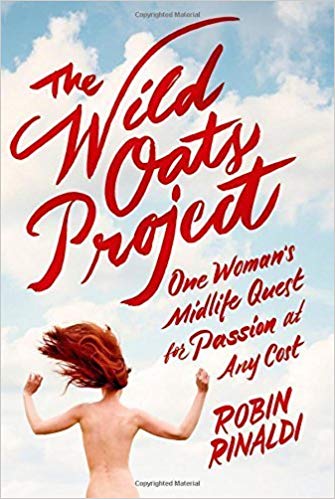 At first reckoning, the premise (and book jacket) of Robin Rinaldi’s The Wild Oats Project seems playful and titillating. A naked woman bouncing happily toward sexual exploration and pleasure, the bold red lettering announcing self-confidence and empowerment, but delving deeper into the memoir provides a different picture. It’s a darker, thoughtful and intricate perspective on what drives relationships, sexual yearning, happiness, and fulfilment. While it’s easy to think that sexual adventure within the confines of a staid marriage have no choice but to end in disaster, putting snap judgments aside, Rinaldi’s experience serves as a reminder of the prudence of fully exploring our own relationship requirements and honestly presenting ourselves and those needs to our partners.
At first reckoning, the premise (and book jacket) of Robin Rinaldi’s The Wild Oats Project seems playful and titillating. A naked woman bouncing happily toward sexual exploration and pleasure, the bold red lettering announcing self-confidence and empowerment, but delving deeper into the memoir provides a different picture. It’s a darker, thoughtful and intricate perspective on what drives relationships, sexual yearning, happiness, and fulfilment. While it’s easy to think that sexual adventure within the confines of a staid marriage have no choice but to end in disaster, putting snap judgments aside, Rinaldi’s experience serves as a reminder of the prudence of fully exploring our own relationship requirements and honestly presenting ourselves and those needs to our partners.
Rinaldi’s account begins with a lighthearted bar scene, being out with friends when she receives a text message from a younger co-worker looking for a hook-up. It’s complete with the should-I-or-shouldn’t-I communal banter, and the attendant nerves that come with such a proposition. As she continues her narrative, we learn that Robin is forty three, ostensibly happily married, and has been entertaining the prospect of an extramarital relationship ever since she and her husband were unable to come to terms on having a child (she wanted one desperately, but only with him). Aside from that, and in her own words, there is no awful husband or abusive relationship, but a treasured one in which both parties love each other deeply.
While her initial hookup is a one-off arrangement, Rinaldi and her husband Scott, on her vocal insistence, eventually construct a detailed and well-considered agreement for an open marriage since she “…won’t go to my grave with no children and four lovers.” Rinaldi would get an apartment to live in during the week, and return to spend weekends with her husband. Both would lead and pursue their own interests in their time alone during the week, practicing safe sex and not sleeping with friends and acquaintances they had in common. It seems rational and manageable, until it isn’t.
The most striking effect of Rinalidi’s memoir is her deep honesty and insight into her own history, albeit it in perfect hindsight and such that it probably would have been more useful in the early stages of her relationship with Scott. Her renderings of her sexual exploits are frank and explicit—without being tasteless, but it is her searing portrait of who shaped the person who met and married Scott, and the nature of their relationship and married life that provide the context to understand how their decisions, both separately and together, led their marriage to its ultimate path.
The trick with this book is in separating your own personal experiences, inclinations and feelings from those presented by Rinaldi. There are many things which she boldly relates that might be either relatable, or unpalatable or unpleasant if heard from a friend, and unfathomable or a consideration in our own relationships, but she makes the point that these things can be hard to know in the midst of life and making choices. The Wild Oats Project is a fascinating look at relationships, and how they are predicated and can only be as healthy as our own self-knowledge and use of such.



